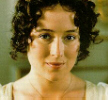 E
L I Z A B E T H
E
L I Z A B E T H
Jane
Austen herself had a great liking for Elizabeth, seeing in her the embodiment
of the gaiety and charm of her own
sister Cassandra. Really she is very nearly the representation of Jane's
own character, especially in her humor. Jane's remark concerning this creation
of her is, "I must confess that I think her as delightful a creature
as ever appeared in print." She is a very living character as well as a
lively one. Her gaiety is apparent in the joy she takes in music and dancing,
as well as in her conversation. Her courage is shown when, though feeling
abaslied in the presence of the Bingley sister during Jane's illness, she
holds her own in the conversation. Although considering herself humiliated
by Darcy's proud attitude, she remembers that she is a "gentleman's daughter"
and adopts in his presence an attitude of equality. Even when intimidated
to some extent by Lady Catherine de Bourgh she does not hesitate to speak
her mind, and, while realizing that Wickham is no longer interested in
her personality, she still defends what she considers to be the truth of
her assertions. Her wit is shown on many occasions in her readiness to
engage in repartee with her father, her sister and especially with Darcy.
Many are the examples of verbal duels between Darcy and herself. For example,
when Darcy declares that poetry is the "food of love" Elizabeth retorts.
She is possessed of good sense. It is she who suggests to her father that
he should refuse to follow Lydia to go to Bighton, since the youngest daughter
has already shown such signs of being utterly irresponsible when her head
is turned by young men; it is she who tries to keep her mother, that
"enfant terrible" from committing too many solecisms, and who, realizing
Jane's love for Bingley, is as helpful as possible to her sister. Her right
apparent feeling is apparent throughout. She knows how to behave in the
presence of visitors and does her utmost to prevent their feeling uncomfortable,
a difficult task when her mother and her sister frequently display outstanding
discourtesy. She does not lose her dignity in awkward situations; in spite
of the ludicrous proposal of Mr. Collins and her realization that Charlotte
Lucas has really just snatched at an offer of marriage, she is able to
visit Hunsford Parsonage without any show of awkwardness. Also after the
trying situation in which she finds herself after Darcy's proposal and
the receipt of his letter, she is able, once the first shock of meeting
him at Pemberley is over, to talk to him with equanimity. She helps Georgiana
to overcome her shyness by mentally putting herself in her place, and her
sympathy goes out to all she thinks are in real trouble- to Wickham on
his supposed wrongs, to her father when he is blaming himself for lenient
treatment of Lydia, or to Jane in her separation from Bingley. Her humor
is shown by her wit, which is never of a cynical nature, and by her ability
to make the best of things. When Mrs. Gardiner gives her a word of warning
about falling in love with Wickham, she retorts very aptly, "He shall not
be in love with me if I can prevent it", and adds, with characteristic
humor,
“A"All
that I can promise you is not to be in a hurry. I will not be in a hurry
to believe myself his first object. When I am in company with him I will
not be wishing. In short I will do my best.”
Her wit is usually based on the ridiculous or pretentious. She is greatly
amused by the excitement caused by the appearance at the Collins' gate
of Mrs. De Bourgh. "Is this all?"” cried Elizabeth, "I expected at least
that the pigs were got into the garden!"
Her attitude to Darcy changes; at times she likes him, at times she dislikes
him; she cannot help being attracted to him in spite of her summing-up
of his character as "odious" and her prejudice against him after their
first encounter. In their verbal fencing-matches it is she who usually
begins the attack. She is resentful about his treatment of her but does
not allow other people to criticize him. She checks her mother for finding
fault with him but at the same time cannot help listening eagerly when
other people talk about him.
As her love grows she is deeply moved each time she meets him and has a
fit of weeping when she realizes that she has already thrown away the chance
of becoming his wife. She is certain as the strong feeling between them
develops that love overcomes all other considerations and she make excuses
for any possible defects in his character by saying, "Intricate characters
are the most amusing"”.
Elizabeth's age must not be forgotten in estimating her character. Being
very young she is often unguarded in her behavior and sometimes she sounds
coquettish, as on occasion when she plays the piano and challenges criticism
of her performance, saying to Miss. Lucas,
“Y"You
are a very strange creature by way of a friend- always wanting me to play
and sing before anybody and everybody. If my vanity had taken a musical
turn you would have been invaluable."
Her imprudence is obvious too when she accuses Darcy of separating Bingley
and Jane and of spoiling the happiness of her sister, and also when she
tells him about Lydia's elopement. But she never means to be impertinent,
and any such apparent impertinence or archness is due to her lively nature.
 Back
Back
 E
L I Z A B E T H
E
L I Z A B E T H